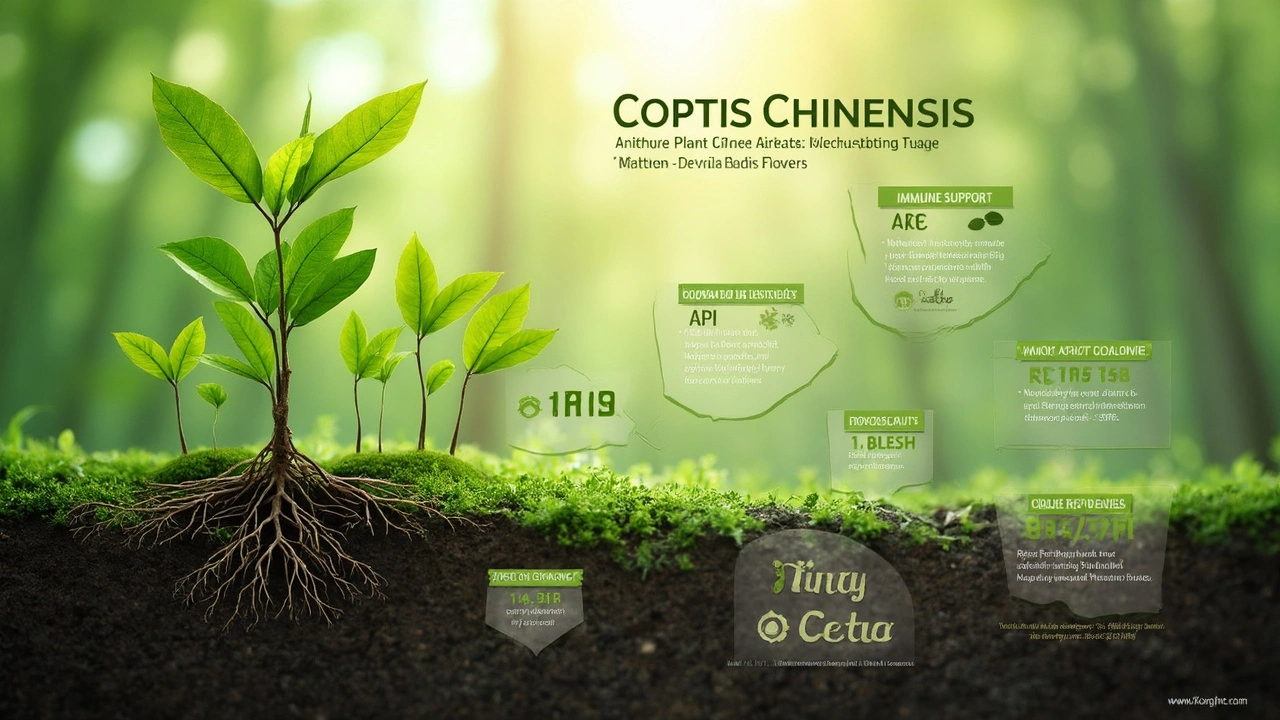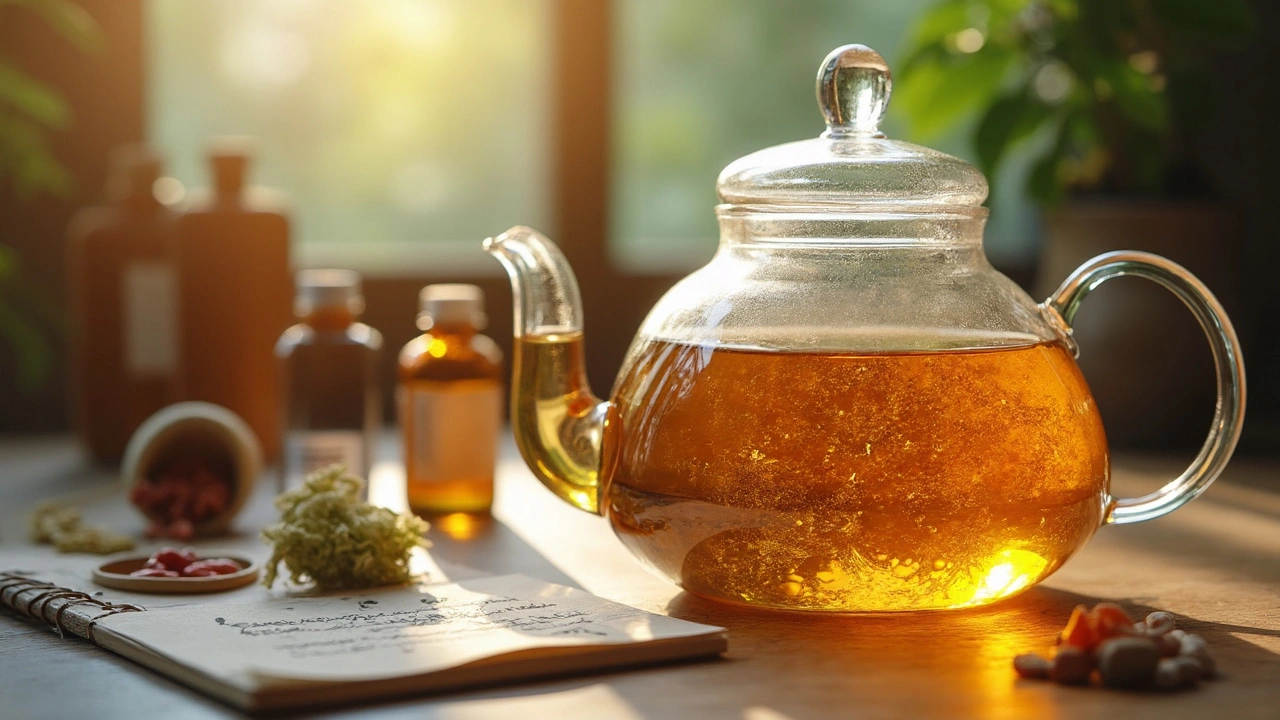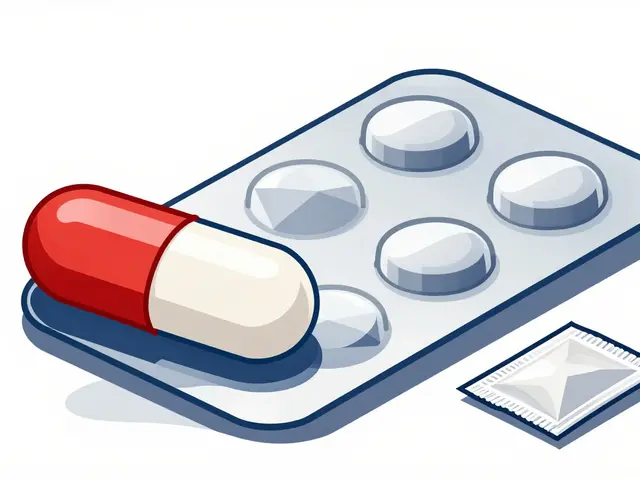Ever hear about a plant that looks unassuming but packs the healing punch of modern medicine? Goldthread has been hiding in plain sight for centuries. Imagine trying to wrangle two preschoolers through allergy season without resorting to cough syrup every week—that’s what goldthread feels like for your immune system. It's a staple in Chinese medicine, but lately, it's been cropping up in health food stores all over the place. People are raving about it for everything from gut trouble to stubborn skin issues. So, what’s fact and what’s just hype? Let’s sort through the noise and see if this golden root deserves a spot in your supplement stash.
The Fascinating History and Origin of Goldthread
Goldthread, or Coptis chinensis, traces its roots (no pun intended) far back into ancient China. Over 2,000 years ago, herbalists prized its bright yellow threads—yup, that’s where the name comes from—for tackling fevers, digestive woes, and even mouth ulcers. What stands out about goldthread is how little its popularity dimmed over time; historical records from the Tang dynasty mention its use, and you can still find it in the ingredient lists for modern Eastern remedies today. Its most active ingredient, berberine, doesn’t just show up in Coptis—other popular plants like goldenseal have it too. But goldthread packs a heavier dose, making it a favorite among practitioners.
If you’re into old-school herbal lore, here’s a cool tidbit: emperors were said to keep goldthread on hand in the palace pharmacies. Early texts claimed it could "banish heat and dampness"—that’s Traditional Chinese Medicine talk for fighting infection and inflammation. Jump to the present, and goldthread is being studied in labs by folks in white coats who, honestly, might have allergies of their own. They’re fascinated by how this little root appears to help with everything from metabolic syndrome to gut bugs. Over $15 million has gone into research for berberine-linked herbs in the last decade as scientists zero in on how these compounds affect human biology.
Goldthread grows best in cool, damp mountain forests. That’s why so much of it still comes from specific provinces in China, especially Sichuan and Yunnan. Small farmers harvest the twisted yellow roots by hand, dry them, and then bundle them up for use in teas, tinctures, and now—convenient little capsules. Backed by both history and hard data, goldthread is one of those few herbs that got embraced by grandmothers and researchers at the same time.
Goldthread’s Powerful Health Benefits Backed by Science
The real star of goldthread is berberine, a compound that stands out because of its potent impact on wellness. And this isn’t just word of mouth—there are plenty of peer-reviewed studies mapping out its effects. According to a 2021 review published in the journal Frontiers in Pharmacology, berberine helps regulate blood sugar, fights certain bacteria, and even supports the liver. I’ve got a cousin whose blood sugar is always a mess, and after trying goldthread extract, her numbers steadily dropped—her doctor actually double-checked the readings, thinking the device was off. Turns out, no, it was the goldthread doing its thing.
Here’s an easy-to-read breakdown of what current research shows:
| Health Benefit | What Goldthread Does | Supporting Study |
|---|---|---|
| Blood Sugar Control | Lowers fasting glucose, improves insulin sensitivity | Yin et al., 2022 (Diabetes Therapy) |
| Digestive Health | Soothes inflamed stomach lining, calms IBS symptoms | Wu et al., 2023 (Gut Microbes) |
| Immune Support | Suppresses certain viruses and bacteria | Lee et al., 2019 (Antiviral Research) |
| Liver Protection | Reduces markers of liver damage | Huang et al., 2020 (Journal of Ethnopharmacology) |
Most folks notice changes after one or two weeks—fewer stomach aches, less bloating, and even clearer skin. In my own house, the biggest surprise was when my son Corin, whose allergies are epic, stopped waking up with crusty eyes after two weeks of a simple goldthread tea. Didn’t change anything else in his routine, either.
Beyond these headline benefits, berberine in goldthread also seems to tame cholesterol, acting almost like a natural statin. Some regular users see LDL (bad cholesterol) numbers fall by 20 to 30 points after three months. No, it’s not a miracle cure, but that’s better than what you’d get from oatmeal alone. And for folks battling low-grade skin problems—think acne or random rashes—there are case reports (look up Zhang et al., 2018) showing clear improvement from both drinking goldthread tea and applying it topically.
Here’s a quote from Dr. Alan Bensoussan, a Chinese medicine specialist:
"Coptis chinensis is arguably one of the most versatile herbal tools we have. Its effects on inflammation and the immune system stand up under modern scientific scrutiny."
If you only remember one tip, it’s this: goldthread works best when you stick with it. Don’t expect magic overnight. Small, steady use, along with decent sleep and some greens in your diet, seems to give the best results.

How to Use Goldthread Safely and Effectively
If you’re ready to give goldthread a shot, start by choosing the right form. The most common options are capsules, powder, tincture, and loose dried root. Capsules are easy—just grab-and-go, and no tea kettle required. But if you’re a fan of herbal brews, the loose root or powder gives you a more traditional ritual. Most adults see benefits from 500-1,200mg a day, ideally split into two doses to keep levels steady. But always start on the low end; some people get a mild stomachache if they go all in too fast.
Here’s what I always tell friends: check your supplement’s source. The best stuff is grown in high-altitude regions of China, harvested without pesticides. Look for purity tested products with a third-party stamp—there are a lot of sketchy imports. My go-to brands are tested in the U.S. and post their certificates right on the website. If your supplement smells earthy and slightly bitter, you’re on the right track—that’s the berberine talking.
- Take goldthread with food to help absorb the compounds and avoid stomach upset.
- If you have a sensitive stomach, start with half the suggested dose for a few days.
- If you’re on other medications—especially for diabetes or blood pressure—talk to your healthcare provider because berberine can amplify these drugs.
- Never give goldthread to babies, and only use with older kids under a doctor’s guidance.
- Store in a cool, dark place, and keep it dry—moisture ruins the roots fast.
I started tiny doses of goldthread extract powder sprinkled in yogurt for my daughter Elowen, who always catches every school bug. It’s bitter, so we hide it in berry smoothies (no complaints so far). She’s gone longer this spring without a single sick day than any time in the past two years. Coincidence? Maybe. But I’ll take it.
Goldthread can interact with certain medications, so don’t skip that research step. It’s usually safe at normal doses, but mega-dosing doesn’t mean mega benefits—and higher amounts can stress out your liver. Pregnant and breastfeeding women should hold off, as there’s not enough data for those groups yet.
There’s no best time of day to take it. Morning or evening works, just make it part of your daily routine so you don’t forget. Consistency beats timing every time.
Who Should Try Goldthread—and Who Should Be Careful?
This supplement isn’t a one-size-fits-all. It’s a game-changer for folks with mild digestive issues, skin flare-ups, or those looking for gentle immune support. If your gut is sensitive, or if you get frequent sinus infections, goldthread could make a real difference. Gym-goers rely on it, too—berberine seems to help with post-exercise recovery, especially if you’re someone who can’t resist pushing one set too far. Several endurance athletes add goldthread tinctures to their recovery shakes and swear by shorter down times after tough workouts.
But a heads up: if you already take prescription meds for blood sugar, cholesterol, or high blood pressure, check with your doctor or pharmacist first. Berberine can boost the effects of drugs like metformin, which can drop your blood pressure or glucose too low. Also, avoid goldthread if you have a history of liver disease unless your doctor gives you the go-ahead. The main thing is to respect the supplement’s power—it’s not just a weak herbal tea.
Children over the age of twelve can sometimes use goldthread for stomach troubles, but always with guidance. For younger kids—like my own—smaller doses under medical supervision may be helpful during cold season, but don’t DIY this with toddlers. My son Corin once tried a tincture thinking it was apple juice (rookie mistake), and let’s just say, it did clean him out, but also kept him close to the bathroom all weekend.
If you have allergies to plants in the buttercup family, steer clear, since reactions can happen. I’ve seen reports of mild rashes or itching in rare cases. For most adults, a test dose—a half-teaspoon of goldthread tea—will give you a clear answer. If you notice anything odd (rash, nausea, tingling), stop right away and check in with a healthcare provider.

Buying and Storing the Best Goldthread Supplements
The supplement aisle is loaded with flashy labels and "miracle" claims, but quality matters more than hype. High-grade goldthread is usually pale yellow and deeply bitter. Don’t be fooled by brands mixing it with fillers; check the label and make sure Coptis chinensis is listed as the main ingredient, not hidden under "proprietary blend." For best results, buy from trusted herbal suppliers or big names that sell direct online. Store goldthread supplements sealed and away from sunlight—light breaks down the berberine fast.
Expiration dates are real with this herb. Dried root and powder usually last for about two years if kept dry and cool. Capsules might hit their peak at eighteen months—after that, you’re rolling the dice on potency. Smell it before using; freshly ground goldthread is pungent, like super-strong honey with a grassy twist. Any musty, old-tea smell means it’s past its best.
If you want to make your own supplement, you can buy the dried root and brew a decoction. Chop a few grams and simmer it gently in water for 20 minutes. Some people sweeten the tea with a little honey or ginger. Just beware—this is potent stuff. Start slow, taste-test as you go, and don’t try to muscle through the bitterness if you hate it. Incorporate goldthread into your routine a few times a week rather than every single day; you’ll notice shifts in energy, digestion, and even clearer thought during stressful times (hello, school finals week).
With the rising popularity of natural wellness, goldthread is more than just a flash-in-the-pan trend. It’s earned a place in modern pantries, ancient apothecaries, and everywhere in between. If you’re looking for a tried-and-true supplement that’s both time-tested and backed by science, goldthread is worth a close look. Just don’t get confused by goldthread teas—the kind with added flavoring and sugar isn’t the real deal. Go for pure Coptis chinensis, keep it handy, and it might just become your family’s not-so-secret health boost.







Adrian Hernandez
July 18, 2025 AT 16:16Honestly, I don't trust half these so-called 'miracle herbs'. Goldthread? Sounds like another one of those pharma cover-up stories to me. The article makes it look all innocent and stuff, but where's the proof of long-term safety?
And they say it's a powerful supplement, yet don't mention any side effects or contraindications. Makes me suspicious, like it’s hiding something. Anyone here actually tried it for months and seen legit results?
Also, I bet big supplement companies are behind pushing this hype to make a quick buck, exploiting health trends. Just saying, I've seen way too many health fads come and go that don't deliver.
Still, I wouldn’t mind if someone shared solid, peer-reviewed studies backing this up. Otherwise, I'm holding my judgment.
Steve Moody
July 19, 2025 AT 16:15Allow me to interject, dear reader, with some clarifications on this charming herb, goldthread. Firstly, the botanical name is Coptis chinensis, properly italicized since we must adhere to scientific orthodoxy.
Anyway, the article was quite enlightening, although I spotted a few minor grammatical slips and could have benefited from more rigorous structure. Nevertheless, this herb is undeniably fascinating, especially due to its bioactive alkaloids like berberine, which have been extensively studied.
For those inquisitive minds seeking encyclopedic knowledge, berberine’s role in modulating metabolic pathways is superbly documented. Yet, intervention studies with placebo controls are imperative before touting any herb as a 'must-have.'
Critical thinking and an adherence to impeccable punctuation, if I may add, are crucial when discussing health matters!
Jessica Hakizimana
July 20, 2025 AT 16:15I find this whole topic genuinely uplifting. Goldthread seems like a natural treasure trove for holistic wellness, and it’s refreshing to see such detailed guidance about its use and safety.
It’s easy to get overwhelmed by the flood of supplements on the market, so articles like this help guide our choices responsibly. Embracing nature’s remedies can harmonize well with modern lifestyle pressures.
Plus, incorporating goldthread could align well with self-care philosophies. Not to mention, sharing experiences with such herbs fosters community and mutual growth.
I’m curious, does anyone here use goldthread regularly? How do you integrate it into your routine?
Steve Helsel
July 21, 2025 AT 16:15Hmm. I skimmed the article, and honestly, it reads like a sales pitch disguised as wellness advice. Lots of vague claims with little meat to back them up. I mean, what’s so special about goldthread compared to any other herb out there?
They say it’s 'powerful,' but without dosage specifics or warnings for people with existing conditions, I’m not buying it. The supplement world is packed with nonsense products that don’t live up to their hype. So I’m skeptical.
Have you guys noticed how these things conveniently don’t mention interactions with meds or where to get good quality goldthread? Red flags everywhere.
Someone with real knowledge better chime in here.
Chip Hutchison
July 22, 2025 AT 16:15Let's try to foster an understanding tone here, folks. Goldthread, or Coptis chinensis, indeed has a rich history in Traditional Chinese Medicine, where it’s valued for its antimicrobial and anti-inflammatory effects.
While scientific research is still evolving, it’s important to respect cultural contexts and traditional knowledge as complementary, not contradictory, to modern science.
If anyone is considering its use, consulting healthcare professionals and reputable sources is the way to go. Also, sharing personal experiences in an open and respectful manner can enrich our collective insight.
So, let’s welcome diverse perspectives and keep the dialogue constructive.
Sheila Hood
July 23, 2025 AT 16:15Sheila here, and I've been watching the goldthread hype with cautious interest. Yes, it has promising active compounds, but I’ve noticed that many folks don't mention dosage accuracy or possible herb-drug interactions.
Honestly, some write-ups overlook these details hoping their hype gains traction instead of responsibility. So steer clear of unregulated supplements claiming miraculous fixes.
Also, for the curious, berberine, the primary alkaloid, has known gastrointestinal side effects at higher doses. Nothing catastrophic, but it’s critical to be aware.
Finally, never underestimate the value of consulting a knowledgeable herbalist or physician before jumping in.
Carlise Pretorius
July 24, 2025 AT 16:15Hey all, I’m glad this topic is getting the attention it deserves. Coming from South Africa, I’ve seen a growing interest in traditional herbs that support immunity, especially in this age.
Goldthread seems like a fantastic addition to that list, and the article’s user-friendly tips might help many to explore it safely without taking risks.
Perhaps we should also consider collaborative research efforts globally to verify and standardize such herbal supplements to benefit diverse populations.
Anyone heard about blending goldthread with other natural remedies and its synergistic effects?
Narayan Iyer
July 25, 2025 AT 16:15Fascinating substance, really. What strikes me is the plethora of valuable alkaloidal compounds that facilitate all sorts of biochemical interactions beneficial for human health.
It’s intriguing how traditional knowledge aligns with recent pharmacological findings, yet the exact mechanisms and efficacies remain areas ripe for detailed investigation.
I recommend diving into journals that discuss berberine’s effect on AMPK pathways and lipid metabolism. That’s where the real magic science happens.
But one must tread carefully — herbal supplements can be double-edged swords if quality control is lacking or if mixed recklessly with pharmaceuticals.
duncan hines
July 26, 2025 AT 16:15Okay, everyone’s dancing around the good ol' truth about goldthread. But let me spill the tea — there’s always drama behind every herb 'trend' in wellness circles.
I bet there are shady growers pumping this stuff with pesticides, or worse. And the supplements? Let's not pretend there aren’t careless companies cutting corners to make a quick buck.
Buyer beware is the motto people. And real talk, how many of us actually know if our goldthread is pure or just a glorified powder with a catchy name?
More transparency needed, less cookie-cutter marketing.
Danielle Watson
July 27, 2025 AT 16:15Just chiming in here to say, this article was a decent intro. I don't think it’s perfect, but it doesn’t scream snake oil either.
One thing I appreciated was the mention of safety and how to use goldthread cautiously — that’s often missing from these write-ups.
Also, the writing was chill, easy to read, and not over-the-top. It feels like an honest take on what goldthread can offer, without overpromising.
I personally want to see some firsthand reports from users for more practical insights.
Achint Patel
July 28, 2025 AT 16:15Philosophically speaking, the allure of goldthread lies not only in its biochemical properties but also in what it represents symbolically — a connection to ancient wisdom and natural harmony.
This blend of tradition and science beckons us to reflect on the intersection of old-world remedies with modern health paradigms.
Isn’t it fascinating how human societies keep rediscovering such elements, trying to integrate them meaningfully?
Nonetheless, while I appreciate the poetic aspect, empirical rigor must remain our guiding compass. Balance, then, is key.